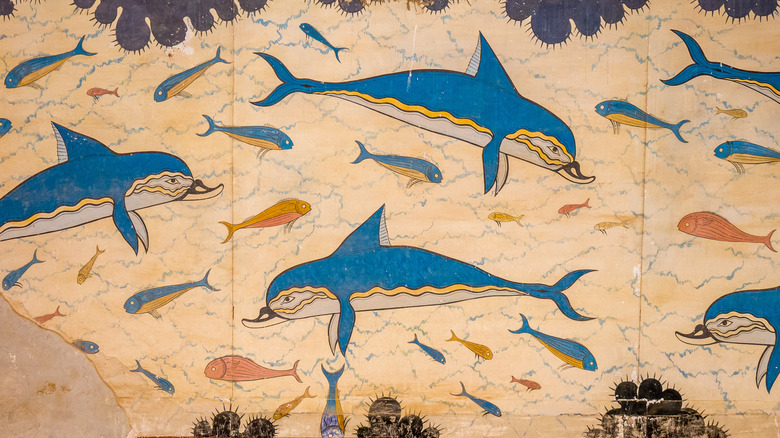This Theory Suggests Atlantis Was A Product Of Plato's Imagination
Ever since Ignatius Donnelly published his book on the veracity he felt Plato's "account" of Atlantis held, theories have abounded regarding the sunken city's existence and location. It has often been referenced in descriptions of other lands claimed by the ocean, including the fictional region of Lemuria and the real-world area of Doggerland (via The Guardian). While rhetorical invocation of Atlantis can be understandable when sunken regions of the world are discovered, literal belief in Plato's descriptions of Atlantis is not so sound upon critical examination.
According to History, no ancient descriptions of Atlantis are known to exist independently of Plato's work, which describes Atlantis as an expansive and indulgent continental empire. Given Hanno the Navigator was exploring the coastal waters of West Africa at this time, surely he or others like him could have found evidence for such a far-reaching people, yet no such account is known to exist. Modern science has similarly turned up no evidence that such a landmass or the earthquakes that supposedly ended it could have ever existed in the Atlantic. As many modern historians and scientists now believe Plato largely made Atlantis up, even seemingly sensible candidates for cultures that may have inspired Plato are questionable.
As Atlantean as the Minoans seemed, Plato probably didn't know much about them
On paper, one of the best sources of inspiration for Plato's Atlantis would be the bronze-age Minoan civilization (via PBS). Centered on the island of Crete, the Minoans were seafaring people whose culture was heavily rooted in their maritime surroundings. Dolphins and fish are among the animals that adorn their palace walls (pictured above), while the art of other civilizations such as Egypt similarly depicts the Minoans as a people of the sea. Their apparent carefree way of life ended in 1613 B.C. when a massive volcano and a possible subsequent tsunami crippled the island. Then ancient Crete was in some sense a real Atlantis that differed only in its location and method of destruction, right?
For modern enthusiasts, sure. However, for Plato, it remains uncertain how much he knew about them for such continuity to have been possible. Plato lived in the 5th century B.C., over 1,000 years after the Minoan collapse. By his time the people of Crete would have culturally differed little from mainland Greeks, while much of the Minoan ruins known today were still buried (via Daily History). It is entirely possible that enough oral tradition and written records survived for him to have been influenced by them. However, more information would be needed on Plato's personal thoughts to know just how much of Atlantis was more than a philosophical allegory.

